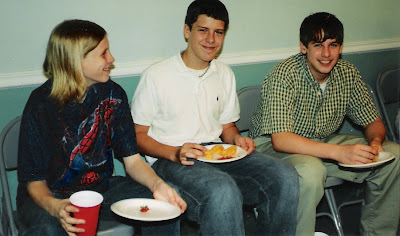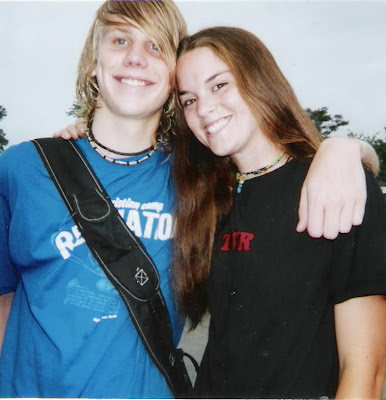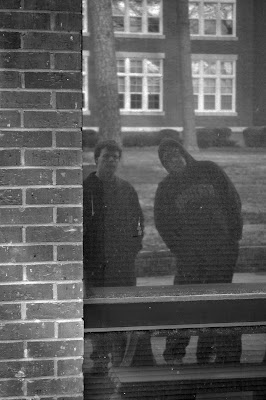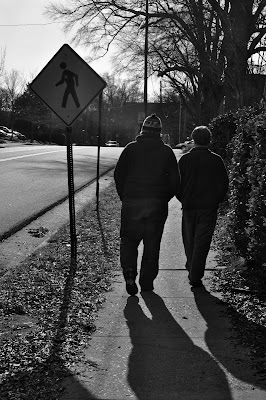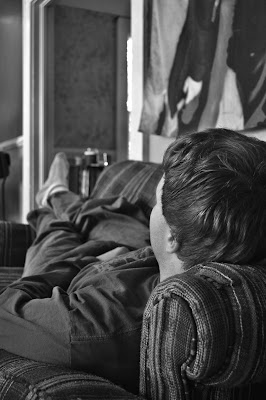The drive from south Miami to Orlando to see Grampa and Granny takes a few hours. In most of the pictures I see of me and my Grampa, I am doing something with him. We are playing with blocks: I love building things, and he is a self-taught artist, so it works out. I remember playing baseball in his backyard, and the times he lets us ride on his lawnmower or in the trailer behind it. I walk into his garage while he and my dad are working on our red Dodge Caravan. I have a vague recollection of either a child-oriented lecture on mechanics, or perhaps just eavesdropping on what they are saying. He comes down and helps my dad fix our house after Hurricane Andrew in 1992.
He is an average sized man, especially when standing next to my six-foot-four dad. Although, when I am a young child, he seems to be the biggest man I know. Everyone speaks well of him: as a kid with everything figured out, I know my mom has to say nice things, it is her dad. But even my dad makes it seem like he is the biggest man in the family. “When you marry a woman, you marry a family,” my father tells me on more than one occasion. I can only assume he has his father-in-law in mind when he says that.
It seems that in all my memories he looks exactly the same: He wears glasses (although he didn’t used to); His hair has always been grayish white. He is never bald, but never has a full head of hair. Even in the old pictures of him, his wife, my mom and her sister, his blonde hair, not balding, looked just like the “Grampa” I visit through the years. He laughs a deep, manly chuckle that only comes from a palpable enjoyment of life and seems to assure you whatever was just said is undoubtedly funny.
We call him “Grampa.” Not Papa, Grandad, Grandaddy, or Granpa. No, he is very specific: he wants to be called Grampa, with an “m.” I don’t know why he wants us to call him that, but we don’t mind. He never asks us to do anything unreasonable, and so as a kid it seems natural, right. As if there is some natural way the world should be, and that way includes me calling him Grampa.
Now that I think about it, he hardly asks us to do anything at all. There is the leaf-raking session every time we visited the house they moved to in the Northeast Georgia mountains, but even that was enforced by my parents, not him. The one request he regularly makes of us is not to fight with each other. The only time I ever see him cry or get angry is when I fight with my brother or sisters. He explains a concept I am reluctant to accept: how “He’ll always be your brother,” or “You’ll always have your sisters, and you need to be there for each other.”
Naturally I try to listen to what he says—my Grampa is, after all, the smartest man ever. I mean, he lived through part of the Great Depression, and World War II. I remember the first time I really understood that. I was astounded that I knew someone who was alive during a time in actual history. He shows me one of his elementary class pictures, and the one thing that strikes me is the lack of shoes. There are only a handful of children with shoes, and Grampa isn’t one of them. In the picture, he doesn’t seem to mind.
My Grampa always impresses me when I think of him, though I can’t tell you exactly what it is that impresses me. It isn’t his stint in the Army at a radio relay base in Africa during the Korean War. It isn’t the successful ownership of Professional Carpet Systems for almost a decade, during which he employed my dad between jobs. It isn’t his car phone—very prestigious to have when they pre-empted the cell phone—although as a kid this is one of the coolest things about him. He always quick adapts to new technology—the computer, internet, and e-mail—not a common feat among his peers. It’s not the multiple battles with heart issues, the quadruple bypass surgery. It isn’t even his faith: a go to church every Sunday and let God’s love show between each visit sort of faith; the kind that preachers preach about when they’re really talking about Jesus. It isn’t any of these things. It is probably all of them, and then some.
He tells me once about how one time in church when another guy had the nerve to put his arm around my Granny before she was dating Grampa. He explains how there rose up in him an incredible urge to throttle the guy. He didn’t, naturally. It was in church. My mom tells me about how he got my Granny. She was the Baptist pastor’s daughter, and their first date was to—gasp—a drive-in movie, an act comparably abominable to dancing. Sometimes I see the old 1950s couple transported to their living room: Still with the pet names and a kiss on the cheek and the occasional clasped hand.
I have a faint memory of his pipe but I may just be imagining that. My Grampa would never smoke. Except that he used to smoke cigarettes but switched to a pipe because my aunt was allergic. He quit the pipe and threw it into a sinkhole next to his house the day his father died of lung cancer. “It’s a three minute addiction,” he says once, “If you can withstand it for three minutes, it’ll go away.” I don’t smoke, so I doubt I’ll ever know if that’s really the case or if my Grampa just has extraordinary willpower. But I sure as hell am not going to pick up a habit that my Grampa tried and then quit. He is, after all, just about the smartest man ever.
As religious as Grampa is, going to visit him never feels like going to church. I’m always learning things, but never being preached at. His favorite hymn is “I’ll Fly Away.” It’s an old country church hymn about going “to a home on God's celestial shore...when this life is o’er.” I never know it is his favorite until they play it at his funeral.
My dad chokes up a little when he tells me. I don’t understand why everyone cries: he didn’t flinch in the face of death—he is escaping “like a bird from prison bars” to “a land where joy shall never end.” But they aren’t sad because it isn’t his time, or because of the tragedy of it all. They are crying because when a man as big as my Grampa passes, you mourn.





